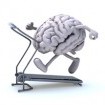Dopamine plays a vital role in why exercise and physical activity feels easy to some, but exhausting to others, a new John Hopkins study reports.
What is Dopamine?
Do you feel excitement, pleasure, and eagerness to carry out exercise or other activities to ‘feel good’? To be rewarded? That’s Dopamine, a brain chemical, kicking in. 
The findings could lead to more effective ways to help people begin and stick to exercise regimes, and, because people with Parkinson’s were the subjects in this study, the results shed new light on the fatigue associated with depression and Parkinson’s disease.
Study leader Vikram Chib, Ph.D reports:
“This study’s results suggest that the amount of dopamine availability in the brain is a key factor.”
Dopamine levels determine how much effort you are willing to exert to complete an exercise task and your sense of ‘easiness’ or ‘difficulty’ when you exercise.
Full report
Source: John Hopkins University
How do you motivate yourself to exercise? Our readers find these tips so helpful.





Regarding getting out of bed, this morning I heard a tip that said, “Say 5,4,3,2,1,Go!”
I’m not sure if we’re conditioned to ‘race’ or compete, or whether my brain needs that time to wake up and get that extra shove, but I tried it slowly this morning and it worked!
1 out of 1!
That’s a fantastic tip! Let’s all try that one – Go!